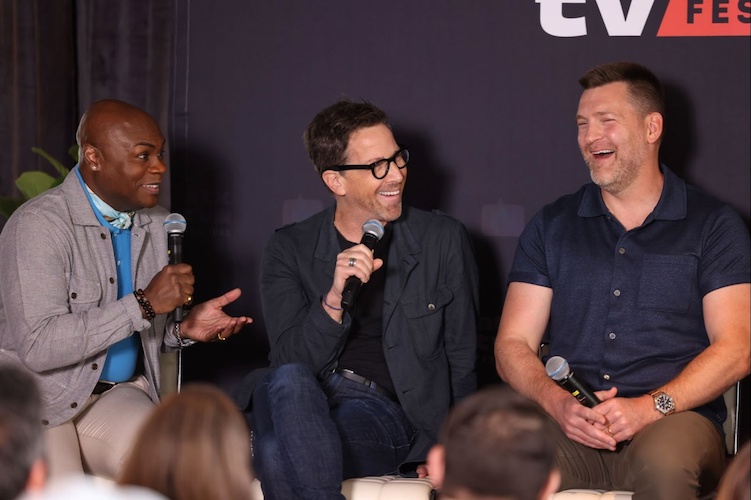Mid-Century, Fully Modern: Queer Creators Discuss Telling Stories Without Shame at ATX TV Fest
ATX TV Festival celebrated the first day of Pride Month with a heartfelt and often hilarious conversation titled “The Future of Queer Storytelling." Moderated by Raina Deerwater of GLAAD, the panel brought together a powerhouse lineup: actor-writer Dan Bucatinsky (Scandal, Mid-Century Modern), actor Jeffrey Bowyer-Chapman (UnREAL, Doogie Kameāloha, M.D.), producer Ben Roy (Finding Mr. Christmas), and actor Nathan Lee Graham (Mid-Century Modern, Zoolander). Together, they reflected on how far LGBTQIA+ representation has come—and how far it still needs to go.
The panel kicked off with personal stories about early queer roles, many of which helped shape careers and cement values. Bowyer-Chapman recalled being discovered at 21 by director Ron Oliver, who told him, “There’s a void in this industry, and you are here to fill it." Graham shared a conservatory teacher’s advice: “If you don’t lie about who you are, you’ll get to the truth of the character faster." And Bucatinsky opened up about the fear he felt releasing his 2001 romantic comedy All Over the Guy. Even as its writer and star, he tried to keep his personal life quiet, worried his sexuality would cost him future work. It wasn’t until he fully embraced his identity that he began to land his most authentic—and most successful—roles.
Ben Roy, whose credits are in unscripted television, shared a formative moment early in his career. While working as a PA on an NBC special directed by Rob Marshall (Chicago, Mary Poppins Returns, The Little Mermaid), Roy witnessed the power of a kind, openly gay creative at the top. “It changed my life," he said. “Rob became the first role model I had as a gay man in this industry. Seeing how respected he was made me realize I could be out too." That experience directly influenced how Roy now leads as a showrunner, by making every set a space where people feel seen.
Both Graham and Bucatinsky spoke passionately about their work on Mid-Century Modern, a Hulu sitcom centered on a group of older queer friends navigating love, friendship, and family in Palm Springs. “We exist after 25," Graham quipped, “and we’re not Martians." Bucatinsky emphasized the joy of writing openly queer characters—across age, gender, and background—without shame or apology. “We’re talking about 40-, 50-, and 60-year-olds. Gay sex. Women in their 80s. This has never happened before, and it’s comedy!"
Over on Hacks, Bucatinsky found a different kind of fulfillment: joining a show where queerness was already baked into the DNA. “My character could’ve been gay, straight, it wasn’t relevant. That’s real inclusion," he said. In one standout scene, Hannah Einbinder’s character makes assumptions about his sexuality, prompting Bucatinsky’s character to correct her, playfully but pointedly: “Don’t assume my orientation." Much of the scene was improvised. “Hannah just kept going," he laughed. “She’s like, ‘There’s a picture of you and a man in Hawaii!’ And I said, ‘You don’t know who that man is.’ We were cracking up. They had to cut it eventually."
Roy’s Hallmark Channel series Finding Mr. Christmas reflects how far queer representation has come in spaces once thought off-limits. The reality competition show searches for the network’s next romantic lead—and includes both gay contestants and a proudly gay co-creator, Jonathan Bennett, as host. “We had football players, a firefighter, an ex-Navy SEAL," Roy said. “When one of the contestants strutted out in a glittery sweater and shared his truth, all the walls came down. That vulnerability became the heart of the show."
Bowyer-Chapman echoed that sentiment in describing RuPaul’s Drag Race as “one of the safest spaces in entertainment." He credited the show with bringing generations together and normalizing queer narratives in ways once thought unimaginable. “You can’t underestimate the impact of a queer show that entire families now sit down to watch," he said.
When asked about industry resistance to queer stories, panelists pointed to a common obstacle: fear. Fear from executives, advertisers, and audiences that marginalized characters may alienate viewers. But as Bucatinsky put it, “If you make something undeniable, they can’t say no." The trick, he said, is to Trojan horse authentic storytelling inside joyful, accessible formats. “Make them laugh, make them cry, and once they’re in, the agenda follows."
The panel also addressed ongoing double standards: queer characters are policed more heavily than straight ones, criticized for being too saintly or too villainous. The solution? More complexity. More messiness. More humanity.
In the panel’s final stretch, each speaker shared their dreams for what comes next. Bucatinsky hopes to continue creating stories about love, aging, and partnership that “just happen to be queer." Bowyer-Chapman imagines a show that blends the genre appeal of Buffy the Vampire Slayer with the sociopolitical edge of Lovecraft Country—through a Black queer lens. Roy wants to use the variety show format to elevate queer artists and preserve the live arts at a time when they’re increasingly under attack.
All agreed that queer stories can’t survive on queer audiences alone. “We’re competing for eyeballs," Bucatinsky said. “And straight audiences need to show up too, or we risk losing these stories."
Bowyer-Chapman issued a candid challenge to queer fans: be kind online. “Executives are watching your tweets. We can’t afford to tear each other down under the guise of shade or critique. We have to lift each other up if we want more of this."
At its core, “The Future of Queer Storytelling" wasn’t a pitch deck, it was a promise. These creators aren’t just looking for space; they’re claiming it. Whether it’s a glittered runway walk on Hallmark, a deadpan retort on Hacks, or a groundbreaking sitcom like Mid-Century Modern centering older queer lives with joy and depth, these stories prove that LGBTQIA+ representation isn’t a trend, it’s a necessity. Queer joy, truth, and humanity are undeniable, and they’re here to stay.
Click here for more coverage from ATX TV Festival. Mid-Centuy Modern is now streaming on Hulu.




